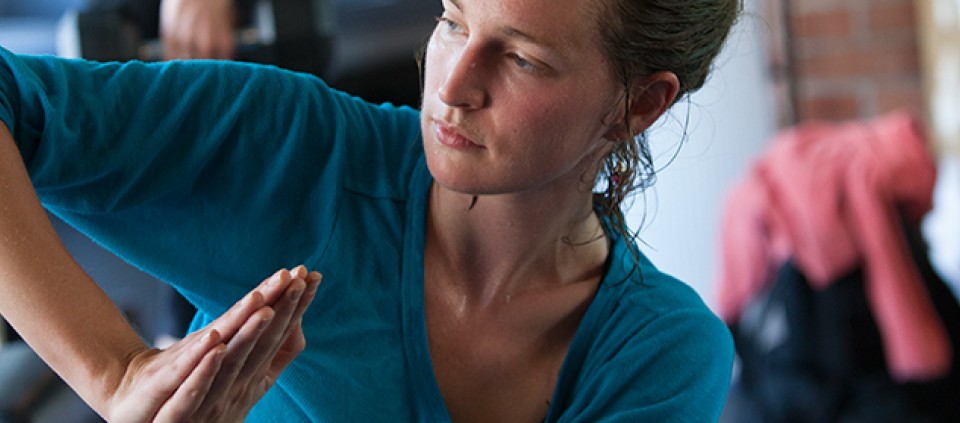Detox for Regaining Balance

The lightning speed at which information assaults us these days is enough to have many of us clamoring for a digital detox. When you toss into the mix long hours at sedentary jobs, tight deadlines, traffic jams, and eating processed and packaged food on the run, it’s no surprise that “digital” isn’t the only type of detox we need.
“Our American culture features ever-increasing levels of stress, and the Standard American Diet (SAD) is filled with junk food,” says Annie B. Kay, Kripalu’s Lead Nutritionist. “I think it’s getting harder to avoid toxic imbalance in our culture.”
Annie says that while our liver, skin, digestive system, and other organs are constantly clearing toxins, our diet and lifestyle may still overwhelm the body’s natural ability to keep a healthy balance of toxins in to toxins out.
“The people who don’t need to detox are those who are doing it on their own,” Annie says, noting that eating a clean plant-based diet, practicing a resilient response to life’s challenges, and being physically active are ways to keep your body’s natural detoxification systems running well. “But I think almost anyone can benefit from a jump-start and the peer support we offer at Kripalu.”
Some people, she admits, are not great candidates for detox unless they’re under the close supervision of a skilled nutritionist. These include pregnant women, people who are physically exhausted, people on psychoactive medications, and those with chronic or advanced disease states (such as cancer, irritable bowel syndrome, or other significant gut issues). “Anyone with these life events requires special attention,” Annie explains. “It’s best if they’re working individually with one of our nutritionists in addition to participating in a program.”
A detox is not the way to go if your primary goal is to lose weight. While detoxification and weight loss are related, Annie says, they’re ultimately separate issues. “Of course, eating clean, managing stress, and getting adequate rest and movement are central to the recipe for weight management,” she says, “but there are limitless ways an individual may come into energy balance. Ultimately, it’s the self-inquiry practice of noticing what works, and making choices that support your body and the whole of your life, that lead to weight management."
When it comes to detoxification, Annie says it looks different for each person. A vegetarian would likely be encouraged to follow a grain-free, soy-free, and dairy-free detox diet, since these foods are often poorly tolerated, she says. “I find that when people take a sabbatical from these foods, many just feel better.” These foods are often highly processed as well, so reducing them in the short term or making a choice to consume them infrequently, if at all, tends to reduce a diet’s chemical load, which supports the digestive system and the body as a whole.
Carnivores don’t necessarily need to give up meat in order to detox. “If you’re a coffee-achiever, someone who regularly has a two-martini lunch and burns the candle at both ends, it may be that simply eating lightly, and taking a sabbatical from sugar, salt, alcohol, and maybe even caffeine, will give your body's natural detoxification abilities a jump start,” Annie says.
What’s best for helping the body come back into balance is food that’s rich in nutrients, with a low chemical load, ideally organic. “We don’t insist on raw food,” Annie says. “Cooked food is more easily tolerated by some people.”
Other elements of a detoxification diet could include the following:
Yoga postures and exercise. “Yoga manages stress and promotes deep breathing,” Annie explains. “It also provides gentle movement of the belly and spine, all of which support healthy detoxification. And if you sweat a bit, all the better.”
Skin brushing and sauna. Skin brushing helps circulate the lymph and release toxins. Time spent in a low-temperature sauna promotes sweating, which also releases toxins.
Water. Drinking plenty of water is critical to the detoxification process, Annie says.
Mental and emotional detoxification. Annie says this looks different for different people, but at Kripalu, “it means practicing mindfulness, learning what compassionate self-observation is all about, and developing witness consciousness.”
Annie acknowledges that it’s not necessary to incorporate all of these elements into a detox, as we’re naturally detoxing all the time. “But detox is a nutrient-driven process,” she says, “so you do need to eat in order for the system to work.”
Ultimately, Annie says, detox is a process of rebalancing on the physical, energetic, emotional, mental, and spiritual levels. “The benefits are that you’ll feel more energetic, healthier, and just better all around.”
© Kripalu Center for Yoga & Health. All rights reserved. To request permission to reprint, please e-mail editor@kripalu.org.